Convergence magazine > The Fulton Difference
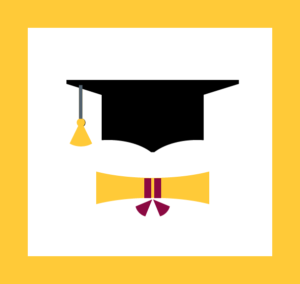
Fulton Schools
offers more than degrees

Fulton Schools
offers more than degrees
Arizona State University’s Ira A. Fulton Schools of Engineering, the largest and one of the most comprehensive engineering programs in the country, has designed a small school culture that has scaled with its growth and allows students to customize their path to a degree.
Known as the Fulton Difference, this group of programs builds a culture that keeps students engaged with each other and faculty at a personal level. The Fulton Difference has grown from a unique orientation to engineering to a suite of services and programs that support student organizations, undergraduate students in research projects and teaching, and social and business entrepreneurship.
Fulton Schools has grown from about 10,000 undergraduate and graduate students in 2011 to more than 23,000 in 2019, offering 25 undergraduate programs and 46 graduate programs.
Incoming freshman are “engineers from day one,” a foundational identity built into the Fulton Difference that begins with the first experience as engineering students — E2.
A three-day event in the mountains of Prescott, Arizona, before classes begin, freshman students begin to meet each other and connect with returning students, faculty and the dean. Returning students lead the freshmen in hands-on engineering projects that require team participation to compete.
After E2, each incoming student is assigned a peer mentor to make the transition from high school to college a little bit easier. Peer mentors connect new students to resources that range from study groups to one-on-one tutoring to simply navigating campus life.
Dozens of extracurricular and co-curricular activities are available to Fulton Schools’ students to create community experiences that also provide valuable career skills — from entrepreneurship opportunities to student organizations and competitive teams to advanced research projects that lead to publishing and presentations at national conferences.
Fulton Schools students also give back to their communities as volunteers and mentors in outreach programs that help demystify engineering for middle school and elementary school students.
The Fulton Difference culture developed to give students and faculty a community feel is the very thing that makes its engineering grads attractive to hiring directors. Fulton Schools’ students enter the marketplace with rich and deep learning experiences.

The Fulton Difference
We believe that engineering is more than traditional coursework. The Fulton Schools are proving that it is possible to provide access to an increasingly diverse population and to advance the experiences of our students beyond the classroom. These ideas have created a world-class student experience.
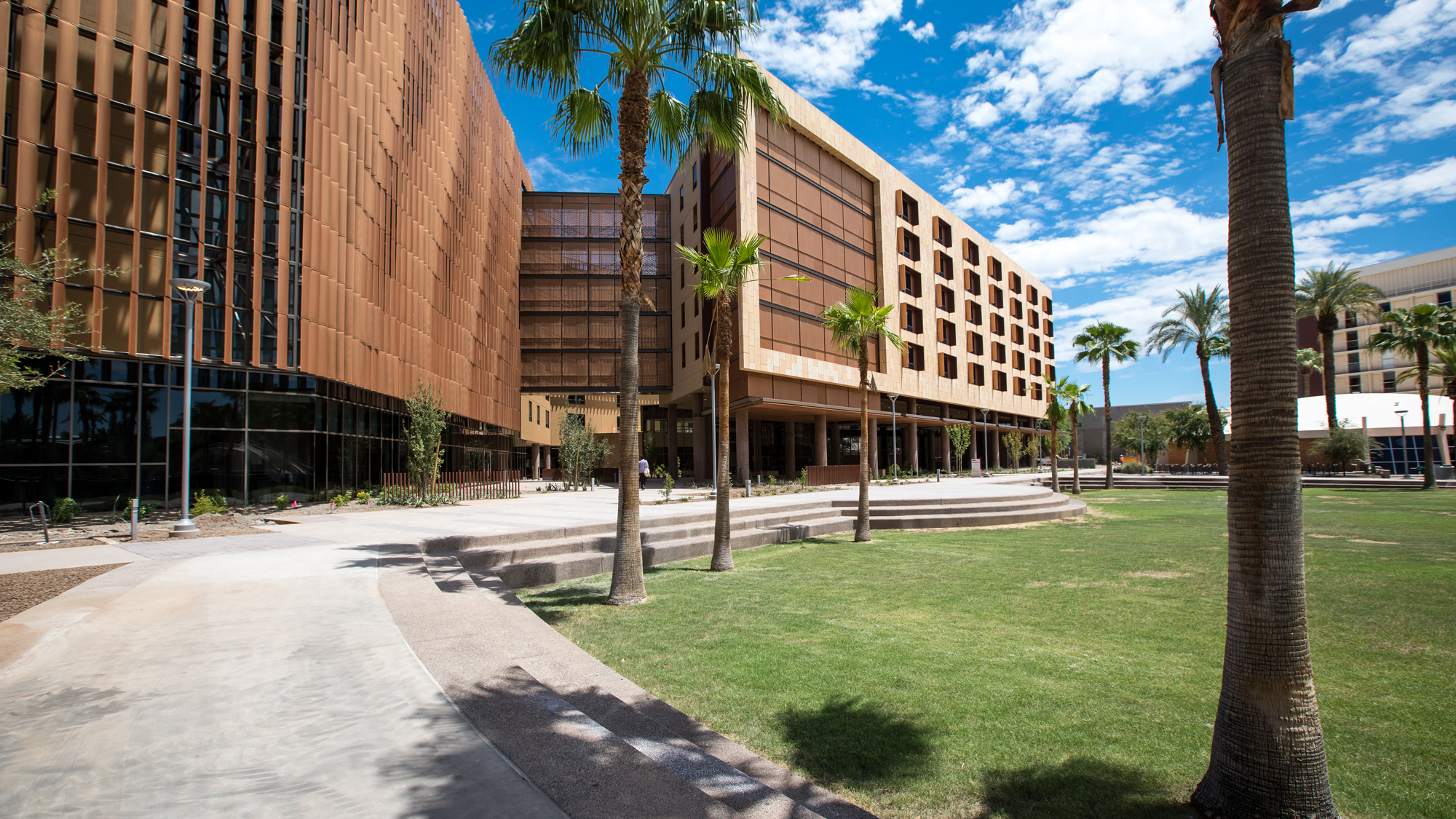
The Fulton Schools Residential Community at Tooker House is a seven-story, 1,600-person, co-ed living and learning community designed specifically for our undergraduate students. The “dorm built for engineers” features on-site digital classrooms, state-of-the-art makerspaces complete with 3D printers, laser cutters and soldering tools needed for a broad range of engineering courses and projects. Tooker House is fully Wi-Fi accessible with enough bandwidth to accommodate four devices per resident.
“A large part in why I chose to go to ASU was all the opportunities for undergraduates to be involved in research. I have had funding for five of the six semesters of research that I have been doing through various programs here at ASU.”
The Fulton Undergraduate Research Initiative (FURI) gives students an opportunity to experience hands-on lab work, independent and thesis-based research, and the opportunity to travel to professional conferences — in short to find their passion and build the skills needed to work in industry or pursue graduate studies. Under a faculty mentor’s guidance, students develop an idea, submit a competitive proposal, prepare research summaries, and participate in a semi-annual research symposium.

ASU’s Institute for Operations Research and the Management Sciences student chapter, better known as INFORMS, created a new software development course for non-computer science and engineering students to improve their coding skills. Additionally, the ASU chapter was one of 11 INFORMS student chapters to receive a 2018 Student Chapter Annual Award given out by the International INFORMS organization at the annual meeting held in November.
The student members of INFORMS also put their skills to the test in industry competitions at the Principal Cup hosted by the University of Michigan INFORMS student chapter in September 2018 in Ann Arbor, Michigan. Logan Mathesen (left), Nathan Gaw (middle), Daniel Tran (right) and Anson Park (not pictured) placed second in the competition, which challenged teams to develop an objective decision-making process to buy, sell or hold stocks using historic data and operations research tools.
ASU’s Institute for Operations Research and the Management Sciences student chapter, better known as INFORMS, created a new software development course for non-computer science and engineering students to improve their coding skills. Additionally, the ASU chapter was one of 11 INFORMS student chapters to receive a 2018 Student Chapter Annual Award given out by the International INFORMS organization at the annual meeting held in November.
The student members of INFORMS also put their skills to the test in industry competitions at the Principal Cup hosted by the University of Michigan INFORMS student chapter in September 2018 in Ann Arbor, Michigan. Logan Mathesen (left), Nathan Gaw (middle), Daniel Tran (right) and Anson Park (not pictured)
placed second in the competition, which challenged teams to develop an objective decision-making process to buy, sell or hold stocks using historic data and operations research tools.
With more than 60 student organizations and competitive teams in the Fulton Schools, students have ample opportunities for fun, leadership, outreach, career growth and networking. Student orgs provide opportunities to apply classroom lessons in the real world, design and complete service projects, exercise communication and leadership skills or just socialize with peers who share the same passion.
Fulton Ambassadors are a select group of students who support the Fulton Schools as representatives at recruitment events with prospective students and at outreach activities.
“Being a member of clubs and other organizations have been a way for me to do what I am passionate about and grow outside of the classroom.”
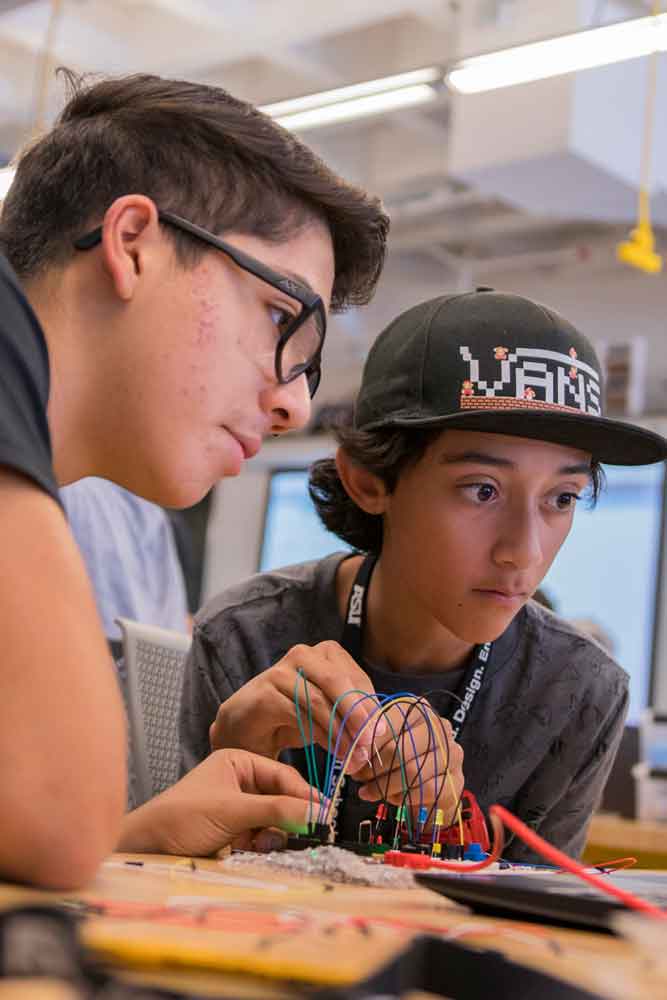
Each summer, the Fulton Schools host a number of summer camps designed to engage K-12 students in science, technology, engineering and math-related activities to share the excitement of engineering and technology with aspiring future problem solvers.
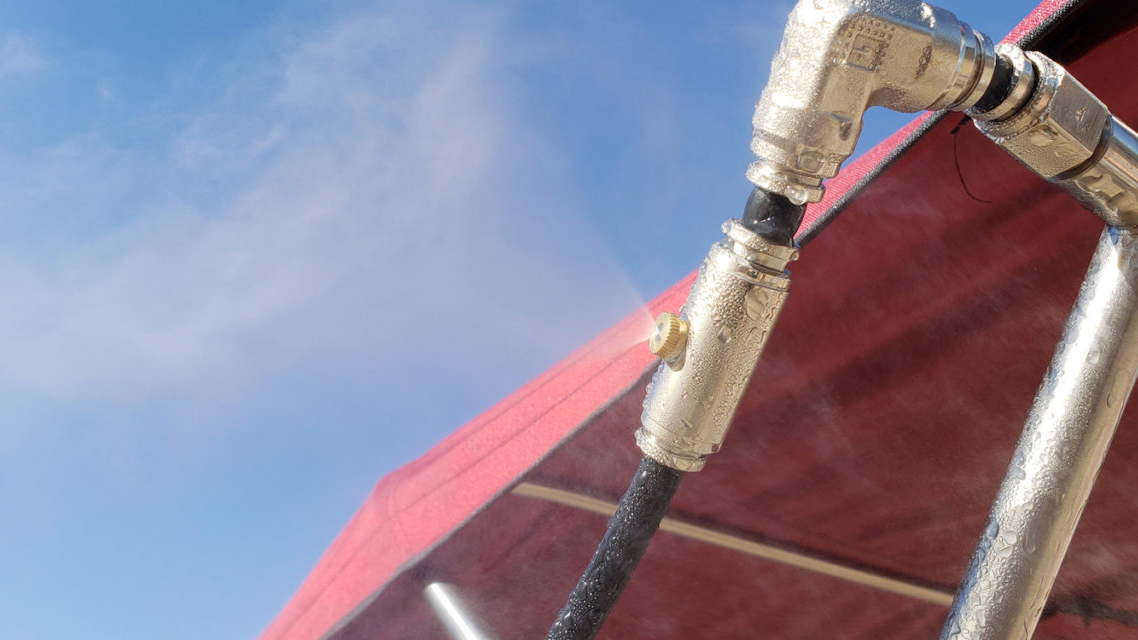
Cool partnership solves hot problem
ASU students worked with a company called Mr. Misters to design a new misting system for boats that uses a solar-powered battery to pump and purify water directly from the surrounding water source, eliminating the need for an onboard refillable water tank. Photo courtesy of Tanner Woodward
The eProjects program is just one way the Fulton Schools allows students to gain hands-on work experience. Each academic year, students collaborate with an industry partner to create innovative solutions for projects proposed by and funded through industry partners to solve real-world problems.
In addition to hosting a three-day career fair every semester for job and internship seekers, the Fulton Schools Career Center partners with employers to host information sessions and coordinate experiential learning programs. Peer Career Coaches help students explore career options in their major through one-on-one meetings and workshops that prepare them for careers in engineering and technology. More than 150 companies recruit our students, including Google, Apple, SpaceX, Intel, Ford Motor Company, Boeing, Amazon, Honeywell and Raytheon.
The Fulton Schools Student Council serves as an umbrella group for our student organizations.
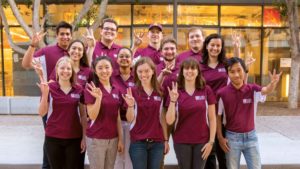
Student Council members have the opportunity to develop leadership skills, understand organizational structures, network with Fulton Schools’ faculty and staff and serve as a conduit for communication between students, student organizations and the dean to help shape the future of the Fulton Schools.
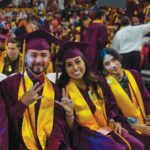 Accelerated programs offer exceptional students in the Fulton Schools the opportunity to combine advanced undergraduate classes with graduate coursework to earn a bachelor’s and a master’s degree in as little as five years.
Accelerated programs offer exceptional students in the Fulton Schools the opportunity to combine advanced undergraduate classes with graduate coursework to earn a bachelor’s and a master’s degree in as little as five years.
Order of the Engineer and Pledge of the Computing Professional are rite-of-passage ceremonies for students graduating in engineering and computing sciences programs. Graduating seniors as well as alumni can join engineers throughout the country in a commitment to promote and recognize the ethical and moral behavior in their professional lives.
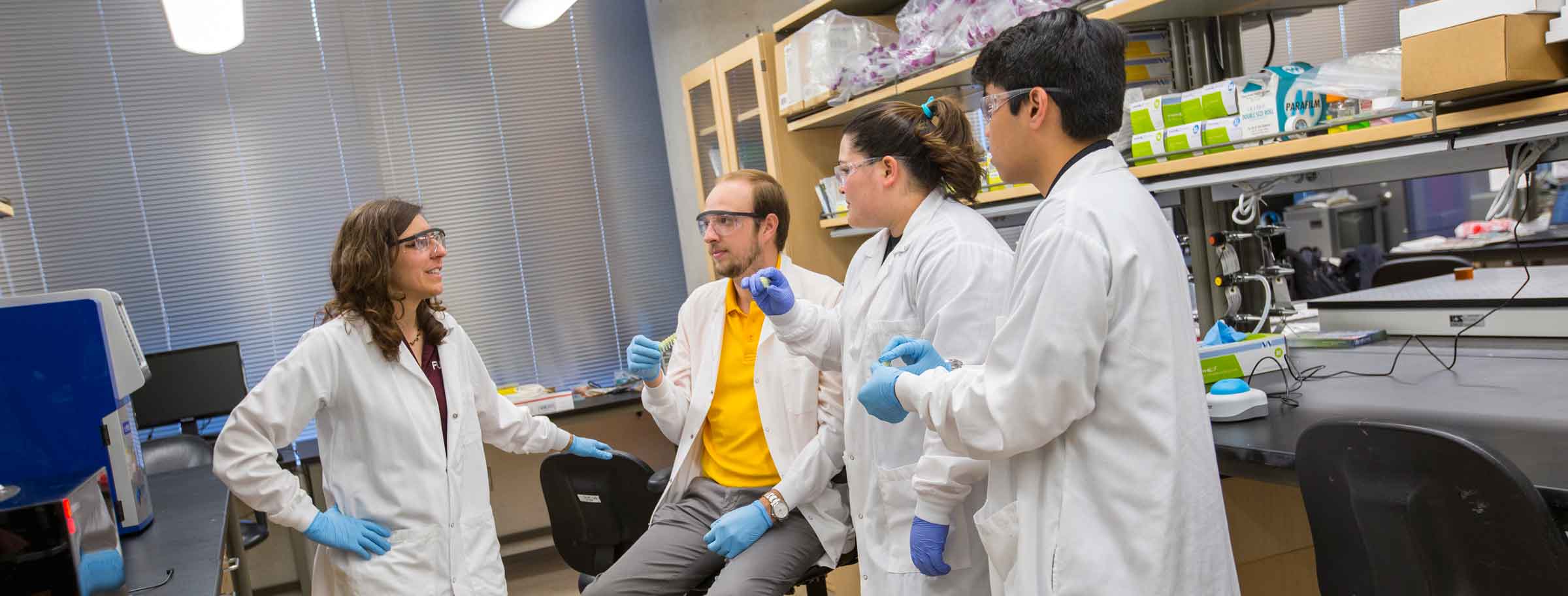
Biomedical engineering research in Assistant Professor Barbara Smith’s (left) lab provided one of many insightful opportunities for recent biomedical engineering graduate Kaleia Kramer (second from right). “I have had an incredible experience come out of each facet of the requirements,” Kramer says. “My research qualified me to attend the White House BRAIN Conference, my interdisciplinary component introduced me to the program, piqued my interest and broadened my perspective on engineers. My global component has led me to my upcoming travel to Kenya this summer to implement my capstone project. My entrepreneurial venture led me to travel to Silicon Valley as a Prescott Fellow this spring, and my service learning component has provided me with exposure to real-world projects, problems and solutions that have been invaluable when applying for industry jobs.”
Grand Challenge Scholars receive the well-rounded preparation needed to tackle complex social issues in the areas of health, energy, sustainability, security and education. Students admitted to the Grand Challenge Scholars Program combine experiences in research, service learning, entrepreneurship and leadership with the development of a global perspective and interdisciplinary thinking.
“All of the counselors, faculty and staff at E2 are there because they want to see you succeed, so ask them how and they will help you!”
E2 is an innovative three-day, two-night program in Prescott, Arizona, that welcomes all freshmen to our Fulton Schools community. E2 Camp Counselors (E2C2s) help incoming students learn skills that are important to their academic success through a variety of
fun and interactive activities.
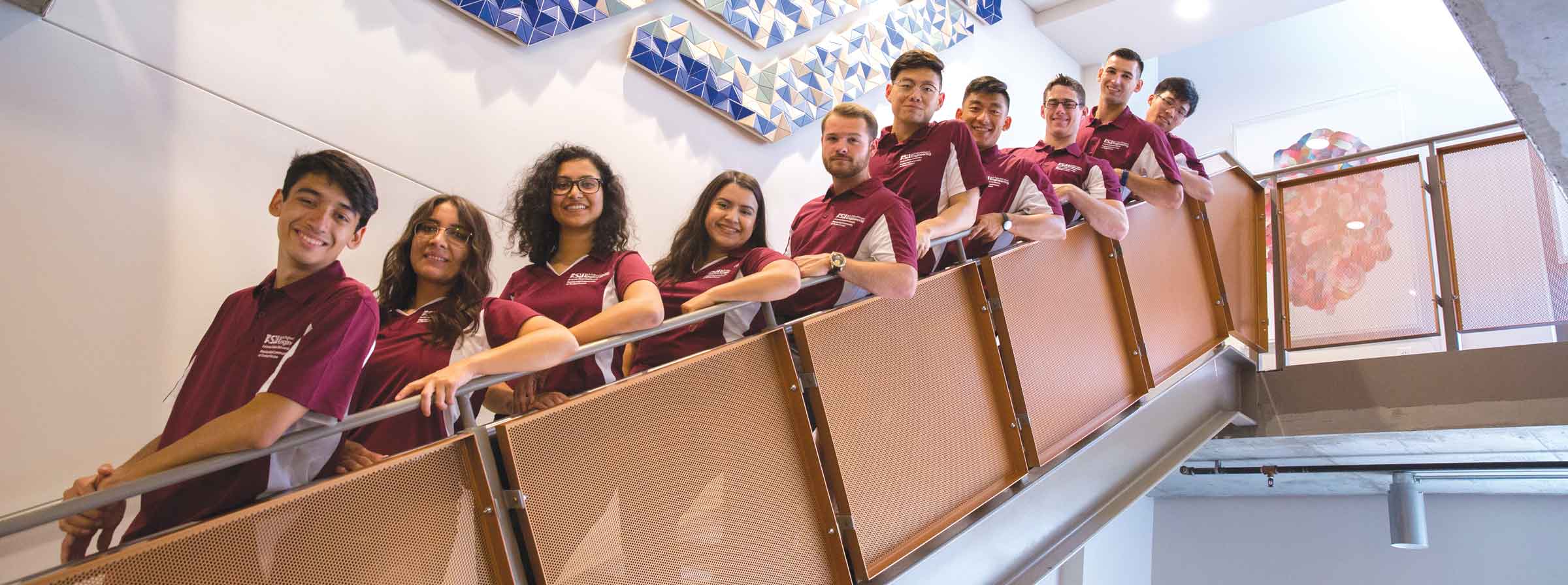
Winning two first-place student poster competition awards recently, Ava Karanjia (above, third from left) is well along the path to becoming an accomplished researcher. She also takes opportunities to help her peers just as her mentors have done for her.
As a residential peer mentor and double major in chemical engineering and molecular biosciences and biotechnology, Karanjia often shares her experiences to encourage students to pursue opportunities outside their comfort zones. “Helping others to realize their passions and successes is something that has made my undergrad experience more valuable,” Karanjia says.
“Your undergrad education is meant for you to collect experiences, different perspectives and viewpoints of the world around you.”
Peer mentors help look out for our freshmen students.
All freshmen — whether living in one of our residential communities, commuting to campus or enrolled in an online program — are assigned a peer mentor who provides referrals to academic resources across campus, hosts events to ensure they feel connected to the Fulton Schools and guides them through the transition to ASU.
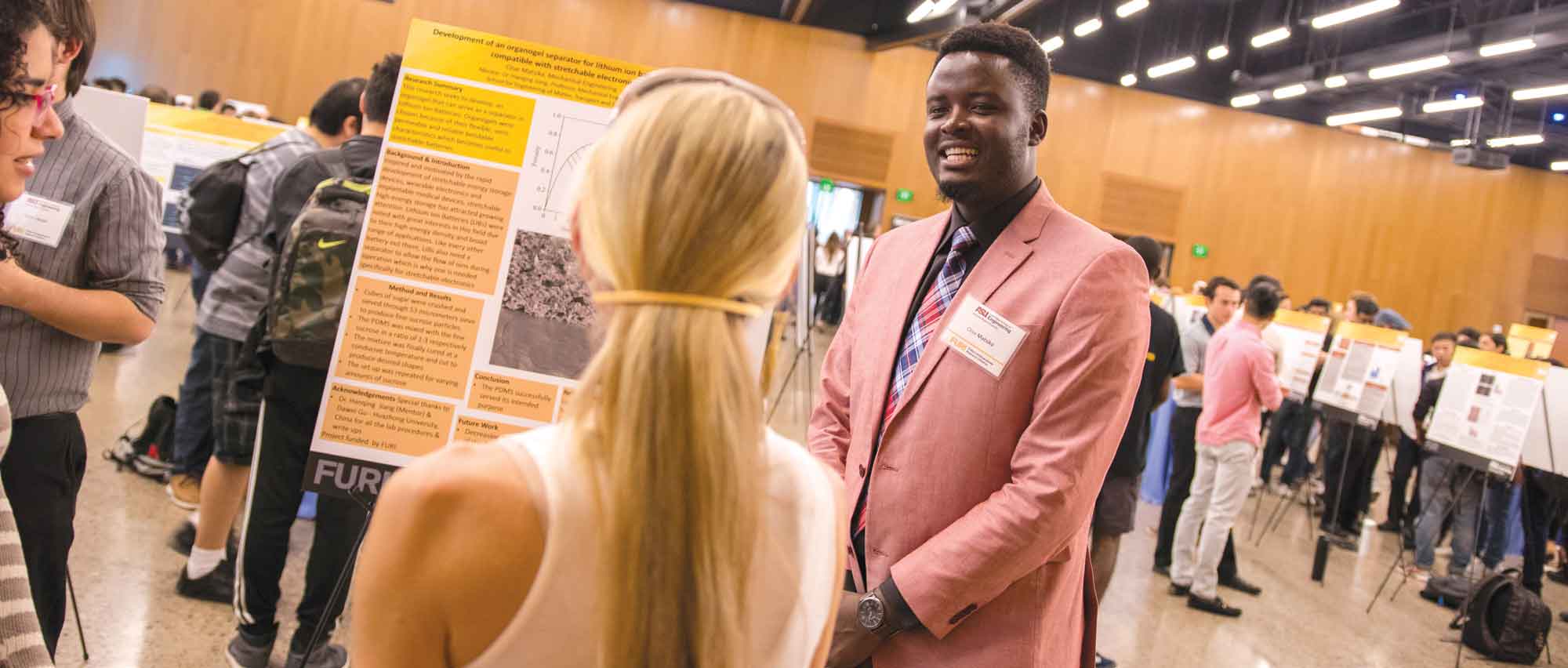
“I loved this research opportunity as it simultaneously fed my innate interests in both engineering and data analytics.”
When Clive Matsika, a mechanical engineering major and honors student, received congratulatory messages from around the world, he began to realize how significant it was to receive the Facebook National Society of Black Engineers Analytics Scholarship to attend NSBE’s 45th annual convention in Detroit, Michigan. Matsika was one of five students globally to be awarded.
“I could not believe it because they were only looking for five individuals from the entire world,” he says. “With my mechanical engineering degree, which in the eyes of many is perceived to have nothing to do with data analytics, I was really surprised and excited at the same time.”
Fulton Schools undergraduate students make up 30% of the unique community at Barrett, The Honors College. As honors students, they
enjoy select opportunities to travel abroad, earn scholarships, attend special events and receive funding to travel and complete their creative projects/theses. Our honors students enhance their learning capabilities by completing a customized honors curriculum.
Tackling the issue of providing electricity to remote villages, the ASU team, known as Pee-Squared, won the ASU portion of Invent for the Planet, a 48-hour global design challenge. Chemical engineering majors Carlos Zamora and Wyatt Del Carlo and computer science major Sahas Chitlange designed and built a prototype light using commonly found materials. The team will continue the project in an Engineering Projects in Community Service (EPICS) course.
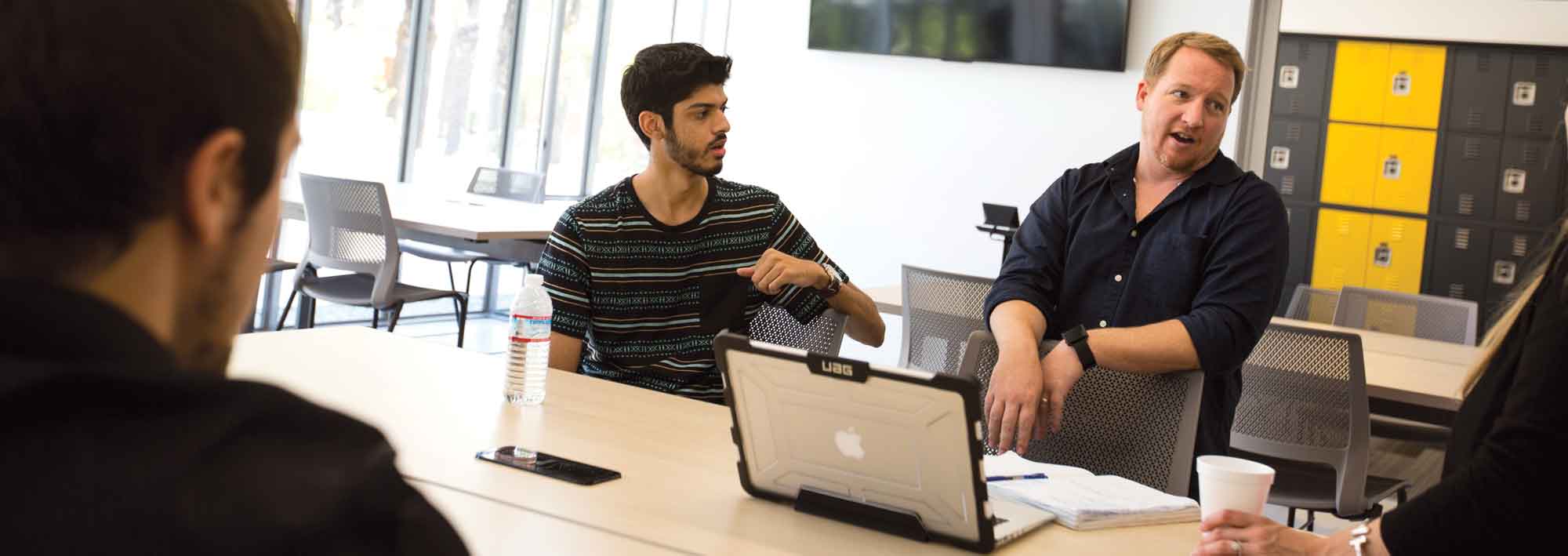
Generator Labs host programming like Devils Invent hackathons, guest speakers and workshops that support a culture of entrepreneurship and innovation. The EPICS program prepares students to enter the workforce with the ability to design innovative solutions to meet clients’ needs in a dynamic environment.
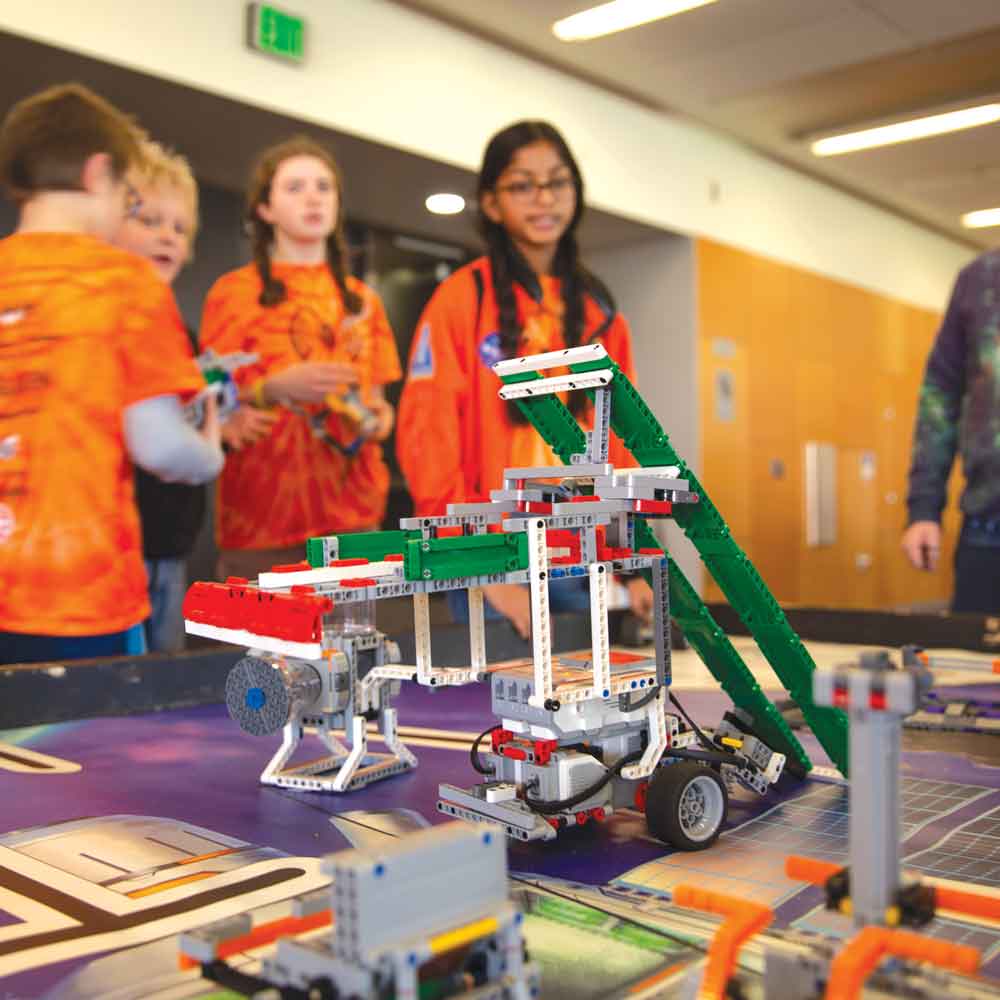
“Very busy” is how Randee Huffman describes her life as she finishes classwork needed to graduate with a bachelor’s degree in mechanical engineering. Her sentiments were echoed by some of her fellow ASU students who made up about a quarter of the 175 tournament volunteers — including teachers, team coaches and mentors, parents and high school students — at the 2018–2019 Arizona FIRST® LEGO® League season championship competition.
“I’m a big fan of FLL. I signed up as soon as I heard about it,” Huffman says. “I plan to come back and do it again as an alum.”
Students can volunteer in multiple outreach programs including Field Trip Days and FIRST® LEGO® League where they promote science, technology, engineering and math in the community and engage younger students in the excitement of what engineers do every day. Through these outreach opportunities students develop mentoring skills, gain volunteer experience and inspire others to pursue studies or careers in engineering and technology.
“There is nothing like watching the light of understanding and excitement in a student’s eyes when they are learning a new concept or mastering an old one.”
Emily Ford, a civil, engineering major, spent part of her time at ASU helping others achieve success as an undergraduate teaching assistant and tutor in the Fulton Schools Tutoring Center.
Fulton Schools tutors are undergraduate and graduate students employed to help their fellow students succeed in math, science and engineering classes. Our newly remodeled tutoring locations offer free tutoring for all of our students’ homework needs.